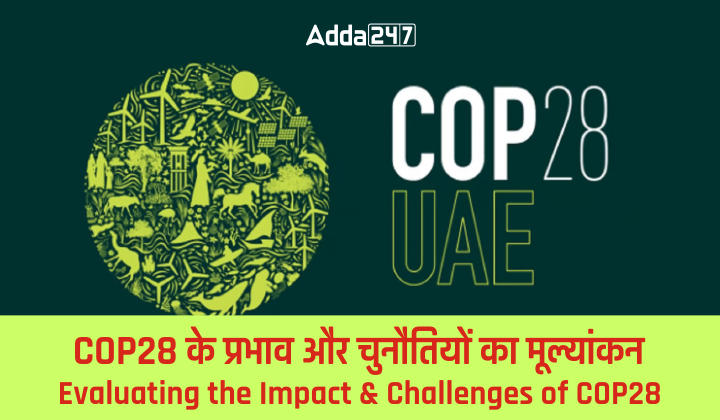Table of Contents
The upcoming Conference of Parties (COP28) in Dubai marks a pivotal moment in global climate action. With the world grappling with the challenges of environmental degradation, the role of major gatherings like COP28 cannot be overstated. This article delves into the significance of COP28, the historical context of India’s involvement in climate negotiations, and the broader implications of hosting such a conference in an oil-rich nation.
Role of COP in Climate Change
COP, the Conference of Parties, is the supreme decision-making body of the United Nations Framework Convention on Climate Change (UNFCCC).
Its primary role is to review and guide the implementation of the Convention, making it a crucial platform for discussing global climate policies.
What is COP28?
COP28 represents the 28th iteration of this global summit. It’s a significant event where world leaders, scientists, and activists come together to negotiate and review the implementation of climate change actions.
Expectations from COP28
As the world grapples with escalating climate crises, COP28 is expected to focus on aggressive measures to combat climate change, with particular attention on the transition to sustainable energy production and the reduction of reliance on fossil fuels.
The Significance of Hosting COP28 in the Oil Kingdom
The choice of Dubai, an oil-rich city, as the host for COP28 is highly symbolic. It represents a critical intersection between traditional energy powerhouses and the urgent need to transition to greener energy sources.
Why does the host country matter?
The host country often influences the agenda and tone of the discussions. Dubai’s background in fossil fuel dependence could bring unique perspectives to the discussions on sustainable energy transitions.
India’s Historical Role in COPs
India has historically played a significant role in shaping climate change negotiations. The country has been a strong advocate for the principle of Common But Differentiated Responsibilities and Respective Capabilities (CBDR-RC), emphasizing the need for developed countries to take a larger share of the responsibility for climate action.
India’s Evolving Position in Recent COPs
India has transitioned from a background player to a more assertive role in recent COPs. The country has been proactive in advocating for equitable climate action, pushing for a phase-down of all fossil fuels, and promoting lifestyle changes to reduce energy consumption and emissions.
Key Debates and Themes at COP28
The Global Divide in Climate Responsibility
There remains a stark division between historically responsible developed countries and developing nations, who feel they are being asked to bear an unfair burden of climate action.
1.5 Degree Celsius Target
A critical discussion point is the aim to limit global temperature rise to 1.5 degrees Celsius. Achieving this target requires a significant increase in renewable energy capacity and a reduction in global emissions.
Addressing the Resource and Trust Deficit
The gap between the required resources for climate action and their availability exemplifies a deeper trust deficit between developed and developing nations.
Paris Agreement and the Kyoto Protocol
Understanding the Paris Agreement and the Kyoto Protocol is crucial to grasping the evolution of international climate change policies. The Paris Agreement, in contrast to the Kyoto Protocol, allows each country to set its own climate action plan without mandatory targets.
Principles of ‘Common but Differentiated Responsibilities’
Both the Kyoto Protocol and the Paris Agreement recognize the principle of ‘Common but Differentiated Responsibilities’, albeit in different capacities.
This principle acknowledges that while all countries are responsible for addressing climate change, developed countries have a greater responsibility due to their historical emissions and resources.
Carbon Border Adjustment Mechanism (CBAM)
CBAM is an emerging concept designed to adjust the carbon content of imports to match domestic prices, thereby preventing carbon leakage and encouraging cleaner production methods.
Challenge Ahead
COP28 stands as a pivotal moment in the fight against climate change. The decisions and actions taken will have profound implications for whether global warming can be kept within manageable limits.
The conference is not just about setting targets but also about finding realistic and equitable solutions to one of the most pressing issues of our time.
Conclusion
The success of COP28 hinges on the ability of nations to come together and address the complex challenges of climate change. The conference presents an opportunity to redefine the global approach to climate action, making it more inclusive, equitable, and effective. The world’s eyes are on Dubai, anticipating meaningful progress and innovative solutions.



 TSPSC Group 1 Question Paper 2024, Downl...
TSPSC Group 1 Question Paper 2024, Downl...
 TSPSC Group 1 Answer key 2024 Out, Downl...
TSPSC Group 1 Answer key 2024 Out, Downl...
 UPSC Prelims 2024 Question Paper, Downlo...
UPSC Prelims 2024 Question Paper, Downlo...




